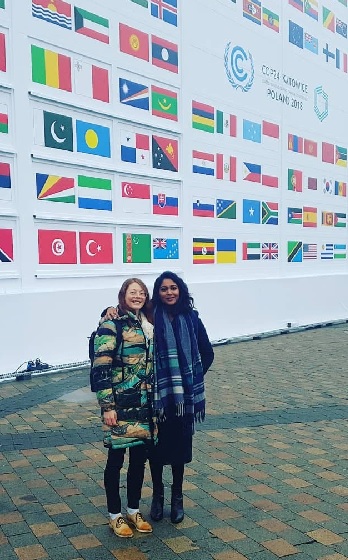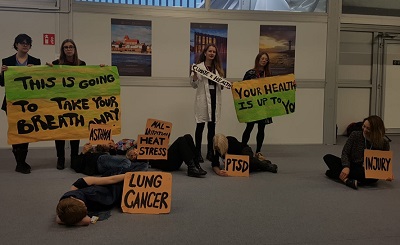A healthy climate for change
 Alice McGushin (UK) of the WONCA Working Party on the Environment writes on recent activities and events on climate change and health. Alice is pictured on the left with outside the COP24 venue with Rashmi Venkatraman, another health and climate change advocate.
Alice McGushin (UK) of the WONCA Working Party on the Environment writes on recent activities and events on climate change and health. Alice is pictured on the left with outside the COP24 venue with Rashmi Venkatraman, another health and climate change advocate.
Lancet Countdown report launch
The last five weeks of 2018 were very eventful for health and climate change, starting with the launch of the 2018 report for the “Lancet Countdown: Tracking Progress on Health and Climate Change”. The report tracks 41 indicators across five key domains in health and climate change, continuously strengthening its methods, data and analysis.
“2018 Lancet Countdown report”
With more heat records being broken around the world in 2018, the health effects of heat was the leading story of the 2018 report. In 2017 as compared to 2000, 157 million more vulnerable people were exposed to heatwaves, and that’s an increase of 18 million from 2016. Also in 2017, there were 153 billion hours (representing 3.2 billion weeks of work) of labour lost due to heat, which is an increase of 62 billion hours from the year 2000.
I attended the global launch of the 2018 Lancet Countdown report in London. Our WONCA Working Party on the Environment chair, Enrique Barros, as well as Mayara Floss, who are the authors of the briefing for Brazilian policy makers on the “2018 Lancet Countdown”, launched the report and the briefing in Brazil, speaking to media and hosting an event in Porto Alegre.
Katowice Climate Change Conference
In the days following, I made my way to Katowice, Poland, for the 24th Conference of Parties (COP24) of the United Nations Framework Convention on Climate Change (UNFCCC). The COP is the annual meeting of the 197 members of the UNFCCC, where all countries negotiate how we can coordinate global action to mitigate (reduce greenhouse gases, similar to “primary prevention” in medical terms), adapt to (prepare for changes we can’t prevent and worse consequences, like “secondary prevention”) and deal with the loss and damage of climate change (recovering from impacts that couldn’t be avoided by mitigation and adaptation, “tertiary prevention”).
The aim of this conference was to finalise a rulebook for the implementation of the
Paris Agreement, set to enter force in 2020. The Paris Agreement 2015, described by former WHO Director-General, Dr Margaret Chan, as the most important public health treaty of the 21st century, was accepted by all 197 members of the UNFCCC. It is an agreement for all countries, low and middle income and high income countries alike, to commit to limiting global warming to well below 2oC by the end of this century, with the ambition of limiting warming to 1.5oC. The difference of 0.5oC may not sound like much, but the recent special report on Global Warming, demonstrates that the differences in consequences are large, with far more people being exposed to the health consequences of climate change, resulting from heatwaves, vector-borne diseases, droughts and floods, storms and displacement with a warming of 2oC compared with 1.5 oC.
In Katowice, parties negotiated the details of how we would enforce the commitments laid out in the Paris Agreement, including how countries would report on their progress towards their commitments and how they could review and rachet up their commitments in order to reach our global temperature goals. It took a while, but now most of the elements of the rulebook are in place.
As a small but enthusiastic group of representatives of the health professionals of the world, our aim was to ensure that the fact that climate change is a health issue is not overlooked in the implementation plans. We put together a
briefing for negotiators to incorporate health in the climate change discussions and plans.

The World Health Organization released its COP24 Special Report on Health and Climate Change in Katowice on December 5. The report comes with a series of recommendations, calling for not only the inclusion of health implications of mitigation and adaptation measures in the design of policies but also the promotion of engagement of the health community as “trusted, connected and committed advocates for climate action.”
Photo: an approved demonstration on health and climate change inside the COP24 venue organised by the IFMSA.
WHO COP24 Special Report on Health and Climate Change
The health community demonstrated its engagement and commitment as health and climate advocates at the Global Climate and Health Summit, which took place in Katowice on December 8. The annual Health Summit serves as a key anchoring event for advancing health-focused action, engagement and collaboration to address climate change and has taken place alongside COP proceedings since COP17 in Durban in 2011. The Summit will also further the Call to Action on Climate and Health which outlines a set of ten priority policy actions for health leadership to advance ambitious progress towards climate and health goals. WONCA was a partner of this event and I presented some of WONCA’s activities through WONCA’s Working Party on the Environment. I was part of a line-up of a diverse range of health professionals tackling climate change, including representatives from the Alliance of Nurses for Healthy Environments, the International Federation of Environmental Health, Médecins Sans Frontières, the NCD Alliance, the World Medical Association and the International Federation of Medical Students’ Associations.
We have made some progress towards tackling climate change, but we still have a long way to go to limit warming to the agreed upon 1.5 oC by the end of this century and prepare our health systems for the health consequences of our changing climate. As family doctors, we are on the frontline of the response to these health risks and are well positioned to step up as our communities’ advocates for stronger action on health and climate change.
Members of WONCA Working Party on the Environment are working on a memo to the family doctors of the world to act on planetary health, to be distributed to all WONCA members. Given WONCA’s members serve over 90% of the world’s population, if we advocate effectively on health and climate change, we could have an enormous impact.
Join our working party